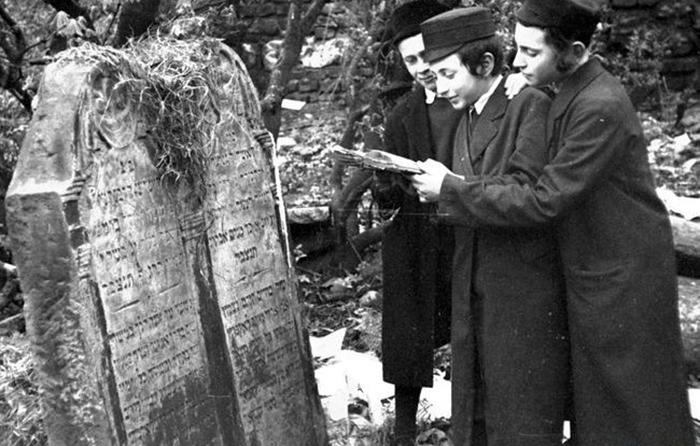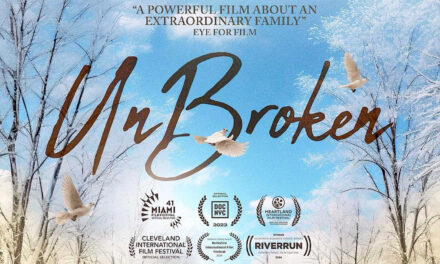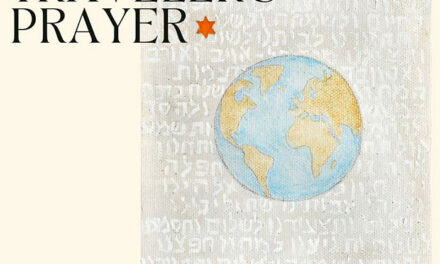A shtetl cemetery
A gruesome ‘visitor’ comes to town
By CHARLES GOLDBERG
Published in Yiddish on Friday, Nov. 5, 1948
It was on a Saturday night in winter, near Chanukah, that my father told me this story. Outside our house a terrible blizzard roared. It seemed as if we would be carried away, house and all. Mama had already heated up the oven, and a delightful warmth began to permeate the house. We children were all seated around the stove, each of us searching for a nice, warm spot. Mama stood near the stove preparing supper; the
delicious aroma wafted in the air and tickled our nostrils. The door suddenly opened, and papa appeared, all covered with snow.
“A pleasant week to all of you,” he said.
“A pleasant week and a pleasant year,” we all responded.
“It’s truly deathly cold outside, but here in the house it’s like Paradise. You have no idea what is going on out there.”
Mama went over to Papa and said, “Go to the porch and shake the snow off.”
While we’re waiting
“Never mind the snow,” Papa replied. “What about supper?” “Everything will be ready in about half an hour, and then we’ll eat.” Papa looked at us and smiled. “If it has to take another half hour, I’ll go out and shake off the snow and then will tell you all a story that happened not far from our city of Bialystok.”
In a few moments he returned, and began his tale:
You know about a district called Stakhisheltzia. In that district there lived an innkeeper named Tzitrin. The Tzitrin family were the Count’s tenants for many generations. Just as the district went from one Count to another by inheritance, so did the tenants pass down from generation to generation. The last tenant of whom I will tell you was a very pious and scholarly Jew. When still a young man, he was ordained by very great rabbis. However, he didn’t want to earn his living as a rabbi because he didn’t want to use his learning for mercenary purposes. When his father died, he took over the business just as his father and grandfather before him had done. Although he was very occupied with his business, he did not neglect the Torah.
Hospitality king
The years sped by; he had children, married them off, and lived to see grandchildren.
Tzitrin took great pleasure in providing hospitality to people. In fact, he had a reputation as an excellent host. Whoever opened his door could be assured of a cordial welcome. He regularly had a minyan (ten men who assemble for prayer) in his house. The poverty-stricken residents of the district would come to him on the Sabbath for communal prayers.
When he reached his older years, he gathered his children together and said to them, “Dear children, I am old; I want you to take over the business. From today on I want to devote myself entirely to the Torah.” From that day onward, he studied Torah day and night.
He arrives
One day, early in the morning, just before Tisha B’Av, a visitor appeared with a pack on his back.
“I’ve come a long way,” he said, “and I’m very tired. I’m going to Bialystok, but since it’s just before Tisha B’Av, I would like to stay here to say Kines” (a prayer of lamentation remembering the destruction of the Temple in Jerusalem).
Needless to say, the visitor spent the day. In the evening, neighboring Jews came together to say Ma’ariv (the evening prayer) and Kines. After prayers, the men sat together and talked of many things. Afterwards, late in the evening, the men dispersed to their homes. The visitor was shown where to sleep and went to bed. The old man remained awake, still studying.
Gevalt!
Early the next morning, when the first neighbor came to the door, it seemed to him that the house was too silent. He became uneasy and opened the door. He saw a horrific scene before him: On the floor near the door, old Tzitrin was lying in a pool of blood. The neighbor raised an alarm and the people from the town ran quickly and gathered at the house. A deathly apprehension enveloped everyone. When they went into the other rooms, they found a body in every one of them. The place looked like a slaughterhouse. The family consisted of twelve people, and all twelve were dead. The murderers didn’t even spare the young children.
The authorities in Bialystok were immediately notified. The police arrived with a magistrate to investigate the crime. They interrogated the neighbors but couldn’t find any trace of the murderer. The whole city of Bialystok was appalled by the terrible murders.
The magistrate decided to call all the neighbors together and said to them, “Does anyone remember seeing a stranger in the vicinity at the time of the murders?”
Disappeared
One of the neighbors remembered about the visitor in the Tzitrin home on the night of the murders. He was not found among the victims. The authorities immediately raised the alarm to search for the “visitor.”
Hundreds of people from all around came to the funeral of the twelve victims. The wails rose up to the heart of Heaven. They were all buried in a single grave, and a large memorial was placed over their resting place. When Rosh HaShanah arrived, or Tisha B’Av, when people would go to the cemetery to visit their parents’ graves, mourners would also stop and weep at the grave of these victims.
The search for the “visitor” went on at a feverish tempo. They searched for him everywhere…in hospices for the poor, in poorhouses, in synagogues. But no one found a trace of him.
Three months after the murders, in a small town not far from Bialystok, a stranger appeared in one of the synagogues. He sat in a corner near the stove and prayed the Psalms. One of the congregants noticed him and informed the police. He was arrested and interrogated. Where was he from? Where was he at the time of the murders? He finally broke down and confessed the horrible murders. He said he was the leader of a band of robbers.
Giving up one vice…
“In my youth I was a horse thief,” he said. “And when the police of the whole region knew me quite well, I decided to give up my ‘profession’ of stealing horses. I gathered together several others like myself and we decided to rob and kill. To that purpose I grew a beard and wore a kapoteh (caftan). I went from district to district, from town to town asking for a night’s lodging. When everyone was asleep, I spied out what was of value in the house. We would then rob the house in the dark of night. If we managed to get away unnoticed, we didn’t harm anyone, but if anyone woke up, we would kill him. In the Tzitrin house, a child woke up and began to cry, so we immediately suffocated it. Meanwhile, the child’s father woke up, so we killed him, too. In order to cover up these killings, we murdered the entire family.”
The murderer was sentenced to death. In those days, a murderer was “quartered.” (This means that each limb was severed separately.) They executed him in the middle of the marketplace in Bialystok. I am told that this story can be found in a book of records in Bialystok so that these victims could be remembered forever.
A story from Tales of Bialystok, translated from Yiddish and published by Phyllis Ross of Slingerlands. The author, her father, Charles Zachariah Goldberg, left Bialystok, Poland, after a pogrom in 1906. He came to America and published poignant stories in the New York City area in the 1930s and 1940s about his experiences in Europe and in America.










